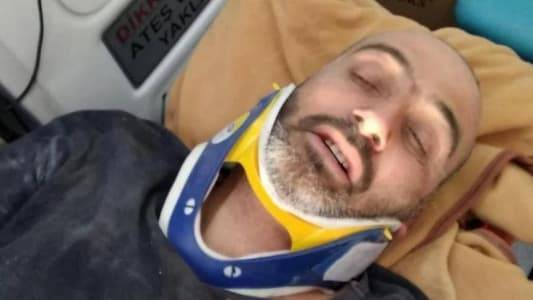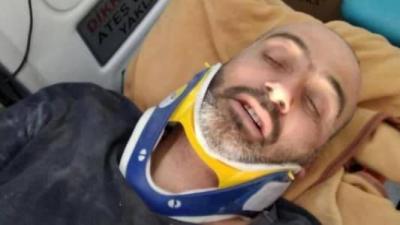The church bells in the town of Sayda al-Mintara – Maghdouche rang joyfully as its residents breathed a sigh of relief after the survival of their son Basel Habqoq, whose news had been cut off along with his companion Elias Haddad in the Turkish city of Antakya following the devastating earthquake that struck early Monday, revealing a humanitarian disaster beyond description in terms of victims, missing persons, and destruction.
Basel spent more than 50 hours trapped under the rubble of the "OZCHIAN" hotel in Antakya (Hatay), which collapsed across its three floors. His brother Fadi confirmed to "Nidaa Al-Watan": "His survival was miraculous after the doorstep protected him," adding, "After more than fifty hours, rescue teams managed to pull him out alive and well. He was taken to the hospital, underwent necessary tests, and then left."
Fadi relayed Basel’s words, "I am fine and in good health, but I will not return to Lebanon before I ensure the condition of Elias Haddad. The teams are still searching for him in the area to rescue him; we pray to God for his survival," describing the fifty hours he endured as "a terrifying nightmare that cannot be forgotten."
At their home in Maghdouche, the family maintained a somber silence; their joy was mixed with tears for Elias. His mother, Mari, stated, "Basel survived by miracle," adding, "At the moment the earthquake struck, he stood by the door of the room. The hotel collapsed, and the wood protected him from death, while Elias was further away." She asserted that "Basel suffered various bruises and was speaking with Elias, which means he was still alive and needed to be rescued urgently."
His companion Ziad confirmed that "the rescue operations are proceeding very slowly. More than 60 hours have passed, and today we are in a frantic race against time between survival and death. The state needs to address the issue quickly before it is too late. We were receiving information from a Turkish citizen who lost his family in the area, and we provided it to the state. Is that reasonable?"
The mixed joy and sadness of the people of Maghdouche was expressed by Michel Moussa, head of the parliamentary human rights committee, saying: "Thank God for Basel Habqoq’s safety, returning from under the rubble. May Elias Haddad and Mohammed Al-Mohammed in the same location and all the missing individuals be found soon. Thanks to all the rescue workers from their various teams." Meanwhile, the Lebanese ambassador to Turkey, Ghassan Maalem, stated: "Basel Habqoq is in good condition after being pulled from under the rubble and communicating with his family."
"We will not lose hope for the survival of the remaining missing," is a phrase echoed in the corridors of Lebanese political and family salons. Sidon, one such location, announced its solidarity with the earthquake-stricken Turkey and Syria, with the passing time revealing the scale of casualties and injuries, not to mention the immense destruction. Emergency rescue teams dispatched from the city to Syria began participating in search and rescue operations.
Ali Dahir, president of the "Youth Movement for Development and Peace Association," who arrived at the head of the team in Latakia, recounted to "Nidaa Al-Watan" harrowing scenes from the earthquake, saying: "An incredible humanitarian disaster; many buildings have collapsed onto the ground, with entire families trapped under the rubble." He anticipated a significant increase in the number of casualties and injured, citing various factors hindering rapid rescue operations, including extensive damage, lack of equipment, and cold weather.
He explained: "We rescued a Syrian citizen in his fifties, and he was taken to 'Tishreen' Hospital in Latakia. We retrieved six other bodies, and the operation to rescue this citizen lasted five and a half hours. We will move to the Jableh area once we finish in Latakia," appealing for "financial support for the mission so that we can continue our rescue mission, which is the least humanitarian and national duty."
In Turkey, the scene repeated as the first mission of the search and rescue team from the Islamic Medical Association in Sidon commenced in one of the destroyed buildings in the "Al-Bustan" neighborhood – Maraş province, following reports of 10 missing persons under the building's rubble. Activists in the civil movement launched campaigns to donate clothing, bedding, and food supplies to assist those affected in Syria.
The Mufti of Sidon and its suburbs, Sheikh Salim Soussan, directed imams and preachers in Sidon and nearby areas to hold a prayer for the deceased in all mosques after the next Friday prayer for the souls of the victims of the catastrophic earthquake in Turkey and Syria, praying to God "to protect Turkey, Syria, and the people of Lebanon from all harm, and all Muslim lands."
In Palestinian contexts, the earthquake's repercussions were not benign in some Palestinian camps in Lebanon, where residents reported damage to dozens of homes already suffering from cracks and fissures, including four homes in the "Jal al-Bahr" camp, two in the "Shabriha" gathering in the Tyre region, and other homes in the Beddawi camp in the north. Abdel Moneim Awad, secretary of the "Palestinian Popular Committees" in Lebanon, informed "Nidaa Al-Watan" that the popular committees in the areas, in coordination with the Union of Engineers in the camps and gatherings, would conduct field surveys of the homes damaged by the earthquake.




